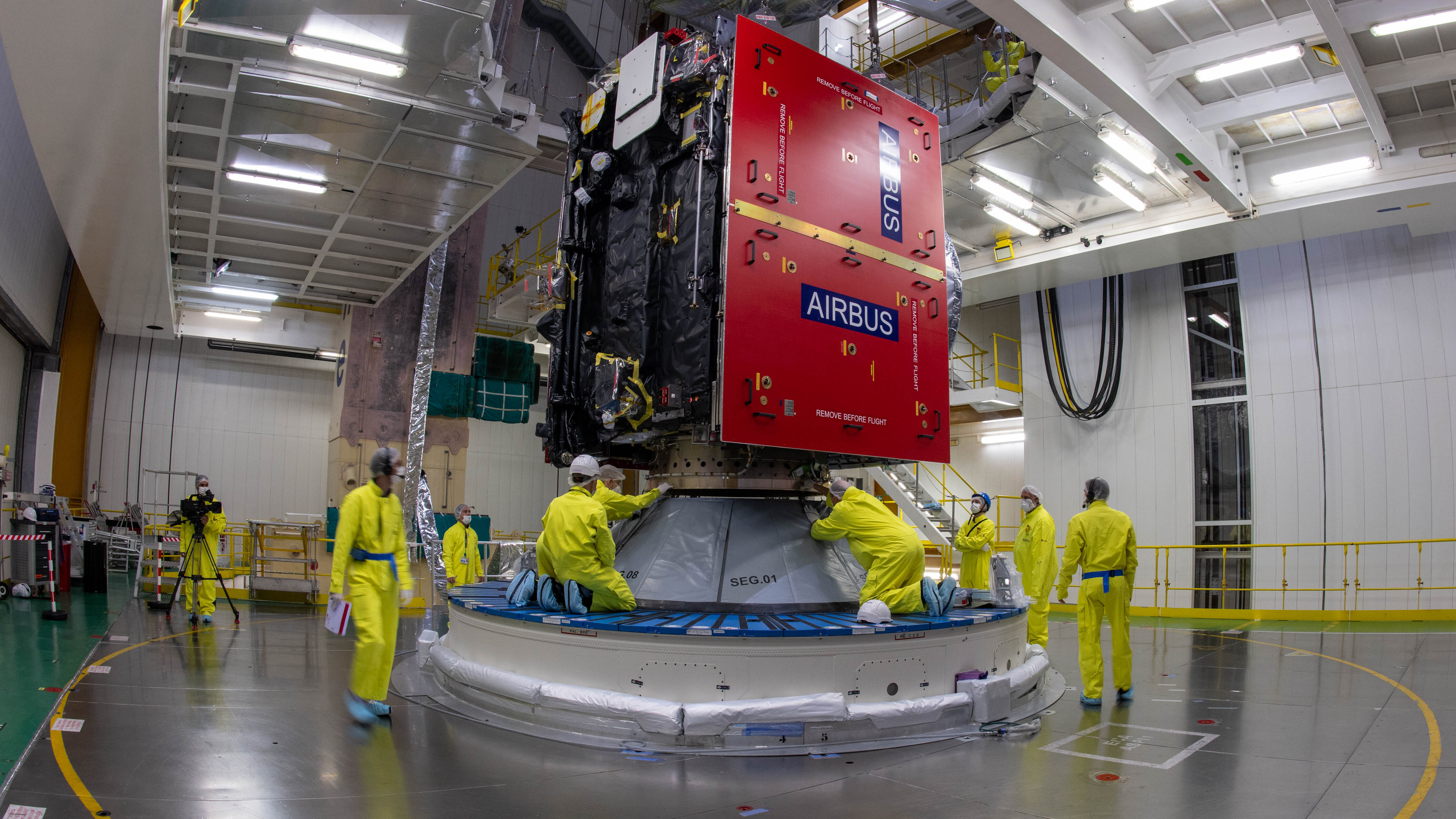Launch of Europe's 1st-ever Jupiter probe is just a week away
The launch of Europe's first-ever Jupiter mission is just a week away.
The European Space Agency's (ESA) Jupiter Icy Moons Explorer probe, or JUICE for short, is scheduled to lift off atop an Ariane 5 rocket from Europe's Spaceport in Kourou, French Guiana at 8:15 a.m. EDT (1215 GMT) on April 13.
You can watch the launch here at Space.com when the time comes, courtesy of ESA.
Related: Europe's flagship JUICE mission will study the Jupiter moons Europa, Callisto and Ganymede.
The liftoff will kick off a long interplanetary journey for JUICE, which will end with the spacecraft's arrival in orbit around Jupiter in 2031.
The 6.6-ton (6 metric tons), solar-powered probe will then conduct a series of flybys of three of Jupiter's four big Galilean moons — Ganymede, Europa and Callisto, all of which are thought to possess oceans of liquid water beneath their icy shells. (JUICE will not study the fourth Galilean moon, the incredibly volcanic Io, in such detail.)
Then, in 2035, JUICE will shift from Jupiter's orbit to that of Ganymede, the largest moon in the solar system. The move will make JUICE the first probe ever to orbit a moon other than that of Earth.
Breaking space news, the latest updates on rocket launches, skywatching events and more!
All the while, JUICE will be eyeing Jupiter and the three target moons with its powerful suite of 10 science instruments, studying them in unprecedented detail.
"The mission will characterize these moons as both planetary objects and possible habitats, explore Jupiter's complex environment in depth and study the wider Jupiter system as an archetype for gas giants across the universe," ESA officials wrote in a mission description.
JUICE's launch will be followed in relatively short order by that of another Jupiter mission — NASA's Europa Clipper, which is scheduled to lift off atop a SpaceX Falcon Heavy rocket in October 2024.
As its name suggests, Europa Clipper will focus on Europa, studying the icy moon in detail during dozens of flybys. (Clipper will orbit Jupiter, as JUICE will initially.)
Many astrobiologists view Europa as one of the solar system's best bets to host alien life, partly because the moon's ocean appears to be in contact with its rocky core, allowing complex chemistry to occur. The buried oceans of Ganymede and Callisto, by contrast, are thought to be sandwiched between layers of ice.
One mission is currently orbiting Jupiter — NASA's Juno, which arrived at the solar system's largest planet in 2016. Juno's mission is expected to wrap up in 2025.
Mike Wall is the author of "Out There" (Grand Central Publishing, 2018; illustrated by Karl Tate), a book about the search for alien life. Follow him on Twitter @michaeldwall. Follow us on Twitter @Spacedotcom and on Facebook.

Michael Wall is a Senior Space Writer with Space.com and joined the team in 2010. He primarily covers exoplanets, spaceflight and military space, but has been known to dabble in the space art beat. His book about the search for alien life, "Out There," was published on Nov. 13, 2018. Before becoming a science writer, Michael worked as a herpetologist and wildlife biologist. He has a Ph.D. in evolutionary biology from the University of Sydney, Australia, a bachelor's degree from the University of Arizona, and a graduate certificate in science writing from the University of California, Santa Cruz. To find out what his latest project is, you can follow Michael on Twitter.

